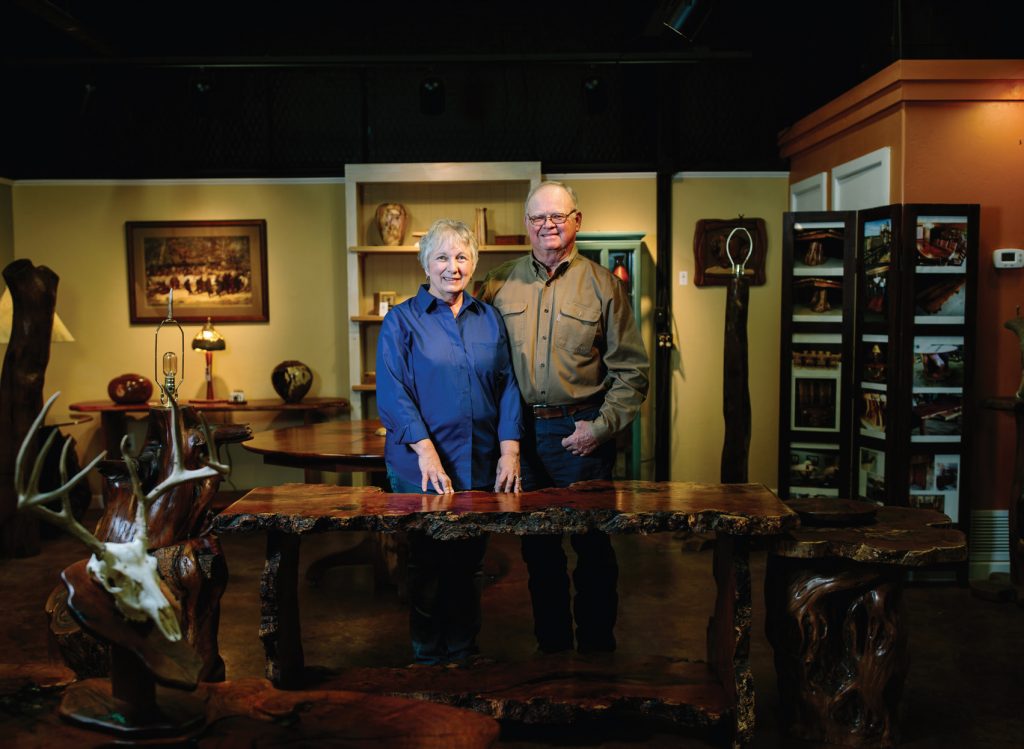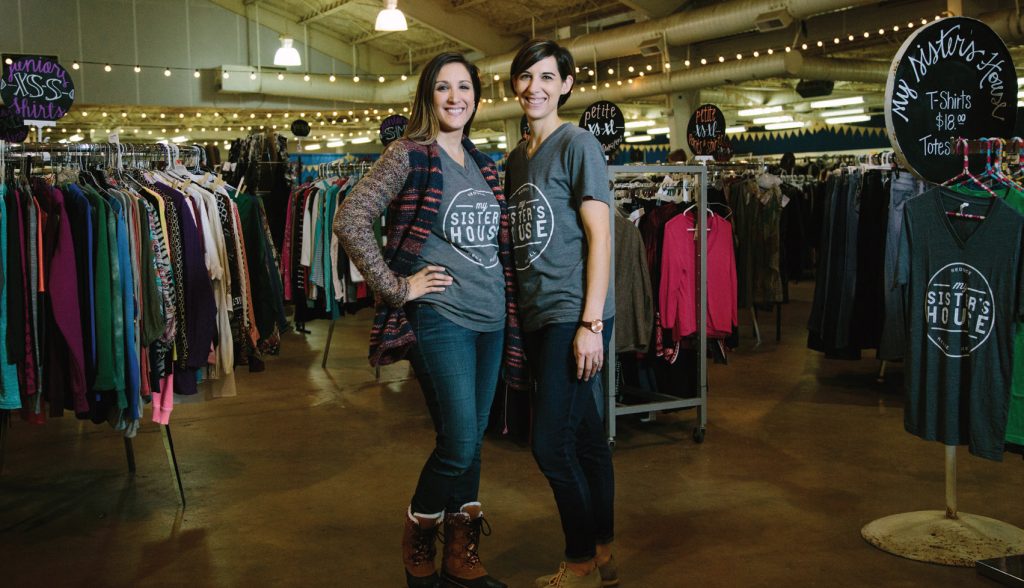Small business owners and entrepreneurs find support and success in Abilene
By Loretta Fulton
Photography by Beth Dukes
It took a first place finish in a business start-up competition to convince sisters Kate Stover and Summer Walters that they were indeed entrepreneurs.
That happened in April 2013 when the sisters won the grand prize in the community division of the annual Springboard Ideas Challenge, sponsored by the Griggs Center for Entrepreneurship and Philanthropy at Abilene Christian University.
In fact, the two sisters, whose consignment business fittingly is known as My Sister’s House, knew so little about running a business that they entered the contest simply hoping to gain knowledge, with no expectation of winning.
“We really did it to learn,” Walters said.
They learned well, and today their twice-a-year sale is put on shoppers’ calendars far in advance of the dates of the event. The spring sale will be held March 23-26 in the display building at the Taylor County Expo Center.
Stover and Walters are far from the only people in Abilene with an entrepreneurial spirit, whether they call themselves entrepreneurs for not. Fortunately for all of them, plenty of help is available to make their ideas – from serious to whimsical – come true.
The Griggs Center, located on the ACU campus, offers a variety of resources such as training, mentoring, and networking for college students and for the general public. Each spring, a luncheon is held to feature the top 20 Springboard Ideas Challenge teams, who are narrowed down to winners in the community division and student division.
“Even if they don’t win, going through the process is helpful,” said Karen Heflin, Springboard program director in the Griggs Center.
Also providing resources are the Abilene Chamber of Commerce and the Abilene office of the Texas Tech University Small Business Development Center.
ACU and the Abilene Public Library main branch both have spaces for people to tinker with their ideas. The Maker Lab is located in the Brown Library at ACU and is open to the public, free of charge, except for the purchase of supplies if desired.
A visit to the Maker Lab is like walking into Santa’s workshop, with very expensive, high-tech toys. 3-D printers and laser cutters whir and move with precision, as entrepreneurs, some looking a little like mad scientists, toil over their projects. A sign on the wall says, “Fail Fast. Fail Often,” words of advice and encouragement for entrepreneurs. Walking through the lab is a different kind of experience, with words like “vector” and “interface” heard often.
Darren Wilson, Maker Lab coordinator, said a mix of art, design, architecture, business, and other students come in to create, as do members of the community at large.
“It’s just a space to create, be innovative,” Wilson said. “It’s just fun to see what people come up with.”
Once a tinkerer thinks he’s on to something that might turn a profit, it gets a little harder, but not impossible. One bit of advice every entrepreneur with a successful business will offer is to ask plenty of questions of knowledgeable sources before hanging an “Open” sign on the front door.
Few will be as fortunate as Walters and Stover, who broke even on their first sale and actually made money on the second one. They did have some help before they started, from family and friends, plus one mentor, but acknowledge they should have dug deeper before announcing they were open for business.
“We did everything so backward,” Walters said, and advises others not to repeat the mistake.
Following are vignettes of three Abilene businesses, including My Sister’s House, started by Abilene entrepreneurs – even if they didn’t know that’s what they were at the time.

LANKFORD’S MESQUITE FURNITURE AND ARTISAN’S GALLERY
Owners, Terry and Susan Lankford
1042 Cottonwood St.
www.mesquite-lumber.com
From the beginning, Susan Lankford was insistent on one thing.
“We’re going to do this right or we’re not going to do it.”
They did it right, and today Susan and Terry Lankford are owners of Lankford’s Mesquite Furniture and Artisan’s Gallery at 1042 Cottonwood St.
The directive from Susan came in 2000. She was an educational diagnostician. Terry’s background was in the limestone quarry and fabricating business, which he learned from his father, who owned a business in Lueders.
But Terry’s passion was in woodworking, which had been a hobby until the couple decided to try to make a go of it full time. That’s when Susan said, “OK,” but only if we do it right, which meant getting professional assistance.
They found it when they met Russ Altman with Texas Tech University’s Small Business Development Center in Abilene. Altman, who died in 2012, was a tremendous help, Susan said, ensuring that they “did it right.”
The Lankfords started their business, creating beautiful pieces of furniture and mantels from mesquite and decorative pieces from gourds, with their own money. It wasn’t until 2004, when they decided to expand and hire extra help, that they needed a business loan.
They went back to the SBDC to get assistance with applying for a loan and with setting up a payroll. What they got was a well-crafted business and marketing plan that Susan still has a copy of.
The loan they got helped them to expand into milling lumber, in addition to creating their own products.
Today, they sell Terry’s mesquite pieces and Susan’s artistic gourds at their store on Cottonwood Street and online. They have managed to turn their artistic talents that once were hobbies into a sustainable business—the dream of every entrepreneur.
Terry grew up being interested in woodworking and later became a cabinet maker and home builder. Even when he was working with limestone with his father, his mind was on woodworking.
“It was a lot easier to cut, for one reason,” Terry said.
He started with lamps and gradually expanded to fireplace mantels and pieces of furniture, all finely crafted from mesquite and polished to a shine. Customers may wonder how a mesquite tree next to his work shed has survived so long.
They’ll just have to keep wondering because that tree isn’t going to be made into furniture anytime soon. The tree and cactus growing on the property create the perfect setting for the business.
“That’s the safest mesquite in town,” Terry said.

MY SISTER’S HOUSE
Owners, sisters Summer Walters and Kate Stover
Twice-a-year consignment sale, display building, Taylor County Expo Center
www.mysistershousesale.com
Kate Stover and Summer Walters see themselves as two of the unlikeliest entrepreneurs in town.
Others see them as two of the most successful, with their twice-a-year consignment sales considered a must-attend event for many people in the area. That is the outcome they dreamed of but didn’t see coming when they opened My Sister’s House consignment sales in October 2010.
They originally operated out of a rented building on Pine Street but soon outgrew that and now have fall and spring sales in the display building at the Taylor County Expo Center. Not bad for two women with no business experience and certainly no grandiose ideas about being entrepreneurs.
“We were English teachers and mamas,” Summer joked.
Kate still is an English teacher,–as well as a mom with two children–but Summer now concentrates on running the business part of the consignment sales and raising her three children, ages 5 to 12.
“Now,” Summer said, “I’m doing this as my job.”
With the blessings of their husbands, Chad Walters and Brandon Stover, the two sisters decided to jump in with both feet and open their business. In retrospect, they wish they had waded in, seeking advice before taking the plunge. It’s advice they give others thinking about opening a business.
“Ask a lot of questions,” Summer advised.
The sisters didn’t do much of that before holding their first sale in 2010. They did OK on their own, with some help from a mentor and their families, but by 2013, they were ready to take the next step. So, they entered the Springboard Ideas Challenge, sponsored by the Griggs Center for Entrepreneurship and Philanthropy at Abilene Christian University. They had no expectation of winning but wanted the learning experience.
They were stunned when they won the $15,000 grand prize in the community division of the competition.
“We invested it all back into the business,” Summer said.
But maybe what they learned was even more valuable. They sought advice from the Small Business Development Center in writing a business plan.
“We could write it,” Kate said, “but we needed help with the numbers.”
The sisters were successful from the beginning, even without professional assistance, but they don’t recommend that approach. They were fortunate to have a friend who had run a children’s consignment business to mentor them, and they devised a method of getting people to volunteer to help in return for booth space at the sale or a chance to shop early.
They didn’t have much overhead since they only rented space twice a year, and at a discount. They even started out doing much of the business part the old-fashioned way, meaning no computers or other electronics.
Now that they are official entrepreneurs and successful business women, the sisters are enjoying what they do even more. It’s a lot of work, but something magical has happened. The sales do more than offer an opportunity for women to clean out their closets and attics and make a little money. A community has developed among the consignors and the people who shop.
As their website says, Kate and Summer believe in shopping responsibly, giving used items a second life, and supporting one another in the process.
“Sisterhood at its best!” is their motto.

YARNIE’S
Owners, Linda and Rick Nygaard
Rose Park Shopping Center, 2506 S. 7th St.
www.yarniestexas.com
Linda Nygaard has been an entrepreneur all her life—but now it’s for real.
“I used to play store all the time,” she said, instead of playing dolls or other games most little girls play.
On June 21, 2011, Linda stopped “playing store” and became a bona fide store owner. On that day Yarnies, a specialty shop for yarns and knitting and crocheting supplies, opened in the Rose Park Shopping Center. Linda and her husband, Rick, who retired at Dyess Air Force Base, plus their biological and adopted children, all put their stamp on the store in one way or another.
“My shop is a whole family affair,” Linda said.
Her creation is a cozy shop that customers flock to, not only to buy knitting and crocheting products, but also to be together.
“It’s kind of a meet-up place for people,” Linda said, as friend Chris Eason nodded in agreement.
Yarnies is the end product of a lifetime of dreaming of owning a shop. Linda’s father owned a paint business in Fargo, N.D., and she inherited his business knack. The knitting and crocheting skills came from her mother and grandmother.
When Linda finally got to the stage in her life when her own store might become a reality, she did two years of research before opening her door. That included online and first-hand research. She interviewed 16 shop owners from Texas to North Dakota.
And then she took a step that she recommends for every budding entrepreneur—she connected with the Small Business Development Center in Abilene.
“That was just invaluable,” she said. “I would encourage anybody who’s going to start a business to hook up with them.”
Linda is pleased with the way things have worked out, but she has hit some stumbling blocks. Even though her shop is the only one in the area, not everyone drops by a yarn specialty shop. Rather than being discouraged, Linda responded to a downturn in business by diversifying – something all new business owners may face.
“You will have to keep recreating who you are,” she said.
She now sells some gift items and she has started creating dyes, some custom-ordered. She sells yarns dyed with her creations, as well as other items like silk scarves. And, she teaches classes in knitting and crocheting.
Linda is pleased with the way her long-awaited shop turned out. And who wouldn’t be. It’s a warm, cozy spot for friends to gather and to create. Just walking into the store creates a feeling. Gift items and supplies are tastefully displayed. The walls are covered with skeins of yarn in every imaginable color.
“It’s like living in a rainbow,” Linda said.



























Leave a Reply